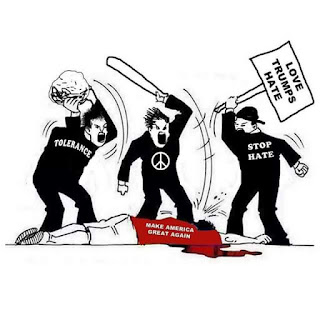Italy: Muslim who threatened to “roast non-believers on skewers” arrested https://t.co/Kuaqup1aZ7 @jihadwatchRS #Islam #sharia #Necromongers— GlobalAwareness101 (@Mononoke__Hime) April 26, 2017
Jihad Watch
written by Robert Spencer
Tuesday April 25, 2017
Mouner El Aoual should be taken immediately to Pope Francis, who would explain to him that true Islam and the proper understanding of the Qur’an reject every form of violence. How fortunate we are to have imams such as Francis to explain it all for us. Now if they could only convince the Mouner El Aouals of the world.
“ISIS sympathizer who threatened to ‘roast non-believers on skewers’ arrested in Italy,” RT, April 25, 2017 (thanks to the Geller Report):
Italian police have arrested an “extremely dangerous” Moroccan man who had reportedly planned terrorist attacks in Italy and used social media to recruit accomplices, according to media reports.
Mouner El Aoual, 29, was arrested in Turin on Monday in an operation which included Italy’s Special Operations Group. It followed seven months of surveillance after an FBI tip-off.
According to media reports, the man used the app Zello to discuss plans to carry out attacks in Italy.
In one chat group online, El Aoual referred to himself as the spokesperson for Islamic State (IS, formerly ISIS/ISIL) in Italy. He used the handle ‘ibn dawala7,’ meaning ‘son of the state,’ and swore allegiance to IS chief Abu Bakr Al-Baghdadi.
El Aoual, who has lived illegally in Italy since 2008, also shared images of IS on Facebook, and praised recent terrorist attacks across Europe.
He also promoted Islamist extremism online, calling for “non-believers” to be “roasted on kebab skewers” and fed to dogs, according to a police report.
The 29-year-old reportedly shared material about various combat techniques and how to throw investigators off track, as well as behaviors which could make a person “invisible” while living in a Western country.
A judge for preliminary investigations called El Aoual an “extremely dangerous subject” who posed a “very high risk of moving on to carrying out serious acts of violence.”
Investigators said he had been living with an Italian mother and son who had come to think of him “almost as an adopted child.”…
The Mackensie Institute
Libya: The Islamic State’s Launching Pad Into Europe (part 2)
written by Dr. J. Paul De B. Taillon
April 27, 2016
Strategic Implications for Italy
Italy, in particular, is concerned both about the steady flood of migrants from Libya and the security of the Libyan oil and gas on which Italy is heavily dependent. A subsea pipeline from Tripoli supplies more than 10% of Italy’s natural gas requirement and a 2012 study reports that 21% of Italy’s oil requirements came from Libyan oil fields. The dependence on Libyan energy is epitomized in Italy’s biggest oil producer ENI which is heavily invested in Libya and continues to pump out the crude despite the security situation in the interior. Interestingly, international energy companies such as Shell and Total departed Libya in the wake of Qaddafi’s fall [that Obama and Hillary Clinton helped to facilitate (emphasis mine)], due to the security threat. Notwithstanding, the Italian ENI company remained, producing 300,000 barrels of oil per day, which is higher than the pre-Civil War output of 280,000 barrels. Although there is some question as to how this company continues to operate, it would appear that ENI has struck a deal to maintain its business interests. The interdiction or severing of energy supplies would undoubtedly have serious economic and strategic implications for Italy but also for countries dependent on Libyan energy sources. Italy’s historic relations with Libya, as well as its strategic interests of ensuring Libyan stability, may result in the proposed Italian-led security stabilization force involved at some point in the future. However, such a stabilization force would only be sent at the request of a UN-backed Libyan national unity government, and that is unlikely given, “The biggest obstacle to peace is not that Libyans cannot find common ground, but that they dare not trust each other to share the same ground at the same time.”
Over the past year (2015/2016), the presence of the IS in Libya has expanded. According to a UN Security Council report, IS fighters have engaged GNC and HOR aligned forces. IS forces have planned and executed attacks against Libya’s largest oil terminals and staged suicide bombings throughout the country. Libya has become one of a number of launching pads for the migrant stream intent on reaching Europe. For the EU, the reestablishment of a viable and effective Libyan government could do much to stem the tsunami of migrants that is wreaking political, economic and social havoc throughout Europe.
Published on Nov 14, 2015: Obama gave this interview 9 hours before the Paris attack. Obama said, "ISIS is not getting 'stronger,' We have 'contained' them".
A Complex Internal Political Situation
The political, religious, and tribal factions resident in Libya are not easily explained. Like other interest groups, they are opportunistic and consist of loose coalitions of political parties and ad hoc militias that inhabit the cities, towns and rural areas, representing various local, regional and national interests. The future government will have to embrace a spectrum of interests and persuade them to negotiate and come to a political compromise. The key to a new plan will be the security arrangements that will have to be forged between the various Libyan factions. More importantly, arrangements must be made as to how the various political parties will control and demobilize their respective militias or possibly integrate these into a national military force. A UN-brokered agreement to address these complex and problematic issues would bring international weight and objectivity to ensure that the future in Libya is aligned with geostrategic realities. The 2015 appointment of a supreme commander of the Libyan military is already a point of contention due to the move by HOR to designate General Khalifa Haftar, a Gadhafi-era general and now an anti–Islamist crusader, into this position. His intent to reclaim Libya from extremism, resonates with a substantial number of Libyans. However, his campaign against the Muslim Brotherhood and all Islamists has been plagued due to his indiscriminate use of violence as well as a bombing campaign that is seen causing collateral damage. His blunt use of force plays into the hands of the extremists who desire the psychological dislocation of the population from the elected government. Haftar leads the so-called Libyan National Army with the political intention of being Libya’s new strongman. He commands regular Army units but has relied upon proxy forces of local militias. In addition, he has a loose alliance with neighbourhood Zintani militia forces that control Tripoli International Airport. Haftar’s appointment did not meet with general acceptance as he is a divisive figure who is reviled by the Islamists and their Turkish and Qatari allies.
A January 2016 meeting between Haftar and the head of the Presidency Council, Fayez al-Sarraj, brought about the suspension of participation by a key GNC member of the Council. Such key leadership appointments must be seen as credible, legitimate and acceptable by all parties as they could easily usurp any national/international progress in creating a sustainable unity government aimed at establishing a lasting peace. Even the location of Libya’s new unity government remains contentious. While the UN agreement identifies that the government will reside in Tripoli, the city is home to hardline Islamist militias that are allied with the GNC and remain hostile towards the agreement. Libya’s other key cities have various factions, with the HOR protected by Haftar’s militias in Tobruk, while HOR aligned militias in Benghazi are fighting groups like ASL and IS. Although the Presidency Council was briefly lodged in Tunisia, and most recently moved to Tripoli.
Preparing For the Possibility of a Foreign Stability Force Intervention
To address the Libyan political and security dilemma, a third-party military power could establish security to reassure Libya’s nascent unity government and the respective factions. This option has been widely discussed in Italy, the EU47 and the United States (US), particularly over the fears caused by the IS presence and expansion within Libya. However, there is little possibility of inserting a large-scale intervention force to provide security under the auspices of the UN or NATO without an official request from an internationally recognized Libyan government.
A Libyan national unity government will not be able to act against the IS anytime soon. In the interim, France has been contributing special forces and intelligence support to the Libyan military, according to Libyan commander Wanis Bukhamada. While it was reported by Le Monde that the French forces were working along American and British elements engaging in a “secret war” against the IS, the French government declined to comment. Meanwhile, the Italian government quietly provided permission for armed American drones to fly out of its NATO airbase in Sigonella, Sicily, with the caveat that the drones were to protect US special operations forces in Libya and beyond. Apparently, American officials are continuing to argue for their use to be expanded for offensive operations against IS training camps and senior operatives. However, such a move could spark the Italian antiwar movement, as well as realizing the potential of collateral damage.
Notwithstanding, these Italian government concerns, this could be a first step in building a multinational coalition employing armed drones and special forces to assist Libyan forces in combating extremist elements. Interestingly, these revelations appear as the Obama administration searches for a comprehensive strategy to be employed against the IS in Libya and elsewhere. These initiatives are taking place while America and its allies patiently await the talks in Libya on forming a unity government, which is a vital first step in creating a viable and united Libyan government determined to fight the IS. The Italian government has stated that if a unity government was to be formed, it would voluntarily send a stabilization force of 5,000 or more troops. Both the US and Great Britain have suggested they were willing to provide support to an Italian-led mission.
Understanding Cascading Consequences
The removal of Muammar Qaddafi in 2011, where the US, France, Great Britain, Canada and other NATO partners, toppled the government under the auspices of the UN, underscores the problems that arise in the wake of an intervention. The forces involved removed Qaddafi’s government without really putting themselves in harm’s way. The strategy of employing airpower combined with ground operations utilizing Libyan proxies, albeit with a modicum of support from Western special operations forces meant that Libya’s regime change was inexpensive in terms of ‘blood and gold.’ This combination of air power, proxies and special operations forces is reminiscent for many of the toppling of the Taliban government in Afghanistan. The failure to plan for a transitional government or to provide assistance to ensure the creation of a stable Libyan government contributed to the creation of the vacuum now being filled by extremists.
Conclusion
The situation in Libya is a salient lesson for both the United States and Europe, for they are both paying a bitter price for not planning for or implementing a Libyan-led transition government, once Qaddafi was removed from power. Undoubtedly, preparing and facilitating such plans for interim governance is fraught with risk. Nevertheless, failing to act has its own dire consequences as witnessed since 2012.
This failure of the international community and initial interim Libyan government to provide governance acceptable to the population at large, in a timely manner, brought about a Libyan political vacuum. Recent events, specifically the arrival of the Presidential Council for Libya and the UN backed Government of National Accord (GNA) arriving in Tripoli on March 30, 2015 have exacerbated an already tense domestic power struggle. This arrival subsequently sparked the National Salvation Government’s appointed prime minister Khalifa Gweil reported departure and re-location to Misrata, while his government refused to relinquish their authority in contrast to initial media reporting. Follow on reports have noted that the National Salvation Government in Tripoli has stepped down enabling the GNA to assert itself in Tripoli. At present it is unclear how the new GNA government led by the PC will be able to effectively assert its authority with respect to the political divisiveness of the country at large. This situation underlines the tenuous and complex nature of Libya’s fragmented and topsy-turvy domestic scene which could easily usurp any hope of forging an acceptable political solution so that the country may commence addressing the serious security and economic challenges it must face.
Libya today is confronting an IS-sponsored insurrection, as well as a disparate group of armed domestic militias operating unrestrained throughout Libya.The West is therefore reaping the results of its NATO led Libyan intervention and once again must learn a lesson reminiscent of the invasions of Afghanistan and Iraq that,
“By rushing heedlessly into battle in 2011, with no clear, long-term strategy, the Western powers have helped create a Frankenstein monster out of the corpse of Libya, a creature that may before long wage jihad against both Europe and the Middle East.”
Libya: The Islamic State’s Launching Pad Into Europe (part 2)
written by Dr. J. Paul De B. Taillon
April 27, 2016
Strategic Implications for Italy
Italy, in particular, is concerned both about the steady flood of migrants from Libya and the security of the Libyan oil and gas on which Italy is heavily dependent. A subsea pipeline from Tripoli supplies more than 10% of Italy’s natural gas requirement and a 2012 study reports that 21% of Italy’s oil requirements came from Libyan oil fields. The dependence on Libyan energy is epitomized in Italy’s biggest oil producer ENI which is heavily invested in Libya and continues to pump out the crude despite the security situation in the interior. Interestingly, international energy companies such as Shell and Total departed Libya in the wake of Qaddafi’s fall [that Obama and Hillary Clinton helped to facilitate (emphasis mine)], due to the security threat. Notwithstanding, the Italian ENI company remained, producing 300,000 barrels of oil per day, which is higher than the pre-Civil War output of 280,000 barrels. Although there is some question as to how this company continues to operate, it would appear that ENI has struck a deal to maintain its business interests. The interdiction or severing of energy supplies would undoubtedly have serious economic and strategic implications for Italy but also for countries dependent on Libyan energy sources. Italy’s historic relations with Libya, as well as its strategic interests of ensuring Libyan stability, may result in the proposed Italian-led security stabilization force involved at some point in the future. However, such a stabilization force would only be sent at the request of a UN-backed Libyan national unity government, and that is unlikely given, “The biggest obstacle to peace is not that Libyans cannot find common ground, but that they dare not trust each other to share the same ground at the same time.”
Over the past year (2015/2016), the presence of the IS in Libya has expanded. According to a UN Security Council report, IS fighters have engaged GNC and HOR aligned forces. IS forces have planned and executed attacks against Libya’s largest oil terminals and staged suicide bombings throughout the country. Libya has become one of a number of launching pads for the migrant stream intent on reaching Europe. For the EU, the reestablishment of a viable and effective Libyan government could do much to stem the tsunami of migrants that is wreaking political, economic and social havoc throughout Europe.
Published on Nov 14, 2015: Obama gave this interview 9 hours before the Paris attack. Obama said, "ISIS is not getting 'stronger,' We have 'contained' them".
A Complex Internal Political Situation
The political, religious, and tribal factions resident in Libya are not easily explained. Like other interest groups, they are opportunistic and consist of loose coalitions of political parties and ad hoc militias that inhabit the cities, towns and rural areas, representing various local, regional and national interests. The future government will have to embrace a spectrum of interests and persuade them to negotiate and come to a political compromise. The key to a new plan will be the security arrangements that will have to be forged between the various Libyan factions. More importantly, arrangements must be made as to how the various political parties will control and demobilize their respective militias or possibly integrate these into a national military force. A UN-brokered agreement to address these complex and problematic issues would bring international weight and objectivity to ensure that the future in Libya is aligned with geostrategic realities. The 2015 appointment of a supreme commander of the Libyan military is already a point of contention due to the move by HOR to designate General Khalifa Haftar, a Gadhafi-era general and now an anti–Islamist crusader, into this position. His intent to reclaim Libya from extremism, resonates with a substantial number of Libyans. However, his campaign against the Muslim Brotherhood and all Islamists has been plagued due to his indiscriminate use of violence as well as a bombing campaign that is seen causing collateral damage. His blunt use of force plays into the hands of the extremists who desire the psychological dislocation of the population from the elected government. Haftar leads the so-called Libyan National Army with the political intention of being Libya’s new strongman. He commands regular Army units but has relied upon proxy forces of local militias. In addition, he has a loose alliance with neighbourhood Zintani militia forces that control Tripoli International Airport. Haftar’s appointment did not meet with general acceptance as he is a divisive figure who is reviled by the Islamists and their Turkish and Qatari allies.
A January 2016 meeting between Haftar and the head of the Presidency Council, Fayez al-Sarraj, brought about the suspension of participation by a key GNC member of the Council. Such key leadership appointments must be seen as credible, legitimate and acceptable by all parties as they could easily usurp any national/international progress in creating a sustainable unity government aimed at establishing a lasting peace. Even the location of Libya’s new unity government remains contentious. While the UN agreement identifies that the government will reside in Tripoli, the city is home to hardline Islamist militias that are allied with the GNC and remain hostile towards the agreement. Libya’s other key cities have various factions, with the HOR protected by Haftar’s militias in Tobruk, while HOR aligned militias in Benghazi are fighting groups like ASL and IS. Although the Presidency Council was briefly lodged in Tunisia, and most recently moved to Tripoli.
Preparing For the Possibility of a Foreign Stability Force Intervention
To address the Libyan political and security dilemma, a third-party military power could establish security to reassure Libya’s nascent unity government and the respective factions. This option has been widely discussed in Italy, the EU47 and the United States (US), particularly over the fears caused by the IS presence and expansion within Libya. However, there is little possibility of inserting a large-scale intervention force to provide security under the auspices of the UN or NATO without an official request from an internationally recognized Libyan government.
A Libyan national unity government will not be able to act against the IS anytime soon. In the interim, France has been contributing special forces and intelligence support to the Libyan military, according to Libyan commander Wanis Bukhamada. While it was reported by Le Monde that the French forces were working along American and British elements engaging in a “secret war” against the IS, the French government declined to comment. Meanwhile, the Italian government quietly provided permission for armed American drones to fly out of its NATO airbase in Sigonella, Sicily, with the caveat that the drones were to protect US special operations forces in Libya and beyond. Apparently, American officials are continuing to argue for their use to be expanded for offensive operations against IS training camps and senior operatives. However, such a move could spark the Italian antiwar movement, as well as realizing the potential of collateral damage.
Notwithstanding, these Italian government concerns, this could be a first step in building a multinational coalition employing armed drones and special forces to assist Libyan forces in combating extremist elements. Interestingly, these revelations appear as the Obama administration searches for a comprehensive strategy to be employed against the IS in Libya and elsewhere. These initiatives are taking place while America and its allies patiently await the talks in Libya on forming a unity government, which is a vital first step in creating a viable and united Libyan government determined to fight the IS. The Italian government has stated that if a unity government was to be formed, it would voluntarily send a stabilization force of 5,000 or more troops. Both the US and Great Britain have suggested they were willing to provide support to an Italian-led mission.
Understanding Cascading Consequences
The removal of Muammar Qaddafi in 2011, where the US, France, Great Britain, Canada and other NATO partners, toppled the government under the auspices of the UN, underscores the problems that arise in the wake of an intervention. The forces involved removed Qaddafi’s government without really putting themselves in harm’s way. The strategy of employing airpower combined with ground operations utilizing Libyan proxies, albeit with a modicum of support from Western special operations forces meant that Libya’s regime change was inexpensive in terms of ‘blood and gold.’ This combination of air power, proxies and special operations forces is reminiscent for many of the toppling of the Taliban government in Afghanistan. The failure to plan for a transitional government or to provide assistance to ensure the creation of a stable Libyan government contributed to the creation of the vacuum now being filled by extremists.
Conclusion
The situation in Libya is a salient lesson for both the United States and Europe, for they are both paying a bitter price for not planning for or implementing a Libyan-led transition government, once Qaddafi was removed from power. Undoubtedly, preparing and facilitating such plans for interim governance is fraught with risk. Nevertheless, failing to act has its own dire consequences as witnessed since 2012.
This failure of the international community and initial interim Libyan government to provide governance acceptable to the population at large, in a timely manner, brought about a Libyan political vacuum. Recent events, specifically the arrival of the Presidential Council for Libya and the UN backed Government of National Accord (GNA) arriving in Tripoli on March 30, 2015 have exacerbated an already tense domestic power struggle. This arrival subsequently sparked the National Salvation Government’s appointed prime minister Khalifa Gweil reported departure and re-location to Misrata, while his government refused to relinquish their authority in contrast to initial media reporting. Follow on reports have noted that the National Salvation Government in Tripoli has stepped down enabling the GNA to assert itself in Tripoli. At present it is unclear how the new GNA government led by the PC will be able to effectively assert its authority with respect to the political divisiveness of the country at large. This situation underlines the tenuous and complex nature of Libya’s fragmented and topsy-turvy domestic scene which could easily usurp any hope of forging an acceptable political solution so that the country may commence addressing the serious security and economic challenges it must face.
Libya today is confronting an IS-sponsored insurrection, as well as a disparate group of armed domestic militias operating unrestrained throughout Libya.The West is therefore reaping the results of its NATO led Libyan intervention and once again must learn a lesson reminiscent of the invasions of Afghanistan and Iraq that,
“By rushing heedlessly into battle in 2011, with no clear, long-term strategy, the Western powers have helped create a Frankenstein monster out of the corpse of Libya, a creature that may before long wage jihad against both Europe and the Middle East.”






































No comments:
Post a Comment